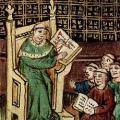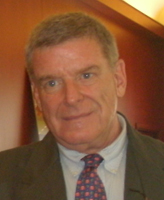224. Kent Emery on Institutions of Learning
Posted on
Kent Emery joins Peter to discuss the effects of monastic and university culture on medieval philosophy.
Themes:
Further Reading
• K. Emery, Monastic, Scholastic and Mystical Theologies from the Later Middle Ages (Aldershot: 1996).
• K. Emery and M.D. Jordan (eds), Ad Litteram: Authoritative Texts and their Medieval Readers (Notre Dame: 1992).
• K. Emery and A. Speer (eds), After the Condemnation of 1277 : Philosophy and Theology at the University of Paris in the Last Quarter of the Thirteenth Century (Berlin: 2001).
• K. Emery (ed.), Philosophy and Theology in the Long Middle Ages (Leiden: 2011).






Comments
Medieval Institute
By the way just to clarify what was said at the end of this episode: technically speaking, I graduated from the Philosophy Department at Notre Dame (my PhD is in Philosophy, not Medieval Studies), but I did take courses at the Medieval Institute too. For instance from Stephen Gersh! See episode 201...
philosopia and theologia
Oh, this professor was very engaged and I really regretted this time that it was over after ca. 20 min, I am sure he could have produced a lot more thoughts if you hadn't stopped him :-) - The flip-flop meaning of philosophia and theologia was an interesting matter. I personally would prefer the earlier meaning, i.e. that philosophy comprises every kind of wisdom including theology, whereas the separation of philosophy and theology (common today I would say) is somewhat artificial. Here we can cite Kant: "Auch kann man allenfalls der theologischen Facultät den stolzen Anspruch, daß die philosophische ihre Magd sei, einräumen (wobei doch noch immer die Frage bleibt: ob diese ihrer gnädigen Frau die Fackel vorträgt oder die Schleppe nachträgt) ........"
Being v. Knowledge
Dear Peter,
I am interested in a particular comment by Prof. Emery in the earlier part of the broadcast, around 8:05 to 8:12. He notes that Socrates prioritizes the order of being over the order of knowing, in that the latter has to undergirded by the former, rather than the opposite—knowledge undergirding being—as would happen starting in the 17th century and after, with the Enlightenment.
I have always been fascinated by this bit of intellectual history as it distinguishes modern (again, the 17th century ff.) from pre-modern modes of philosophy.
I have a better sense of this (I think) with Plato himself and Aristotle on the priority of being over knowledge, with their respective stresses on form and substance as fundamental categories by which we know. Where do find this idea stated by Socrates? I assume it will be one or more Platonic dialogues, but I would be grateful for specific references. Anything you’d care to add on Plato and Aristotle (and Plotinus!—interested in how negative theology works in this, as it sounds, at least, paradoxical) would be most appreciated. Referencing past episodes is perfectly fine too . . . !
Thanks!
Rhys William Roark
OKC, OK USA
In reply to Being v. Knowledge by Rhys William Roark
Socrates on being
Thanks for your comment - of course Socrates didn't write anything, so I took Prof Emery to be talking about Plato's Socrates and his postulation of Forms as the "targets" of our knowledge. In other words we have a metaphysical theory in which we postulate these paradigms so that there is something for us to know about. The classic passages would be the Socratic "autobiography" in the Phaedo, or the middle books of the Republic (5-7) perhaps.
Finally!
At last I'm caught up with the podcast!
Aristotle
I have to retell this story to myself, because it is so striking:
Circa 1500 years after his death, the translation of some works of Aristotle (those previously unknown to Latin speakers) into Latin were regarded as innovative, and reoriented entire fields of study. They were not just historical discoveries, they were regarded as cutting edge texts!
This happened in lands and regimes and among peoples deeply indebted to ancient Rome, but totally foreign to Aristotle himself, to whom Rome meant nothing (indeed in his day it would have seemed less impressive than Carthage I guess). Which is to say, Aristotle himself could have never dreamed of a target audience such as this - descendants of barbarians who adopted a religion that he could never have imagined.
In all those centuries not one Latin speaking philosopher emerged who could have rivalled Aristotle in metaphysics and natural philosophy and made the translations of the latter look superfluous or erroneous to 13th century thinkers. So many great minds appeared in the Latin speaking world from 322 BC onward (and this is an understatement bordering on absurdity), and yet none with the authority of Aristotle on these matters? What is it about Aristotle's original philosophy that made it seem so superior to everything else? I mean all the Platonists, the Stoics, the Epicureans, Latin Church fathers, etc., some of whom had already digested and incorporated some Aristotelean thought into their own, and still...
In reply to Aristotle by Guy of Jerusalem
Aristotle
Fair question! But I think it's more complicated than that. Obviously yes, Aristotle is absurdly brilliant, and his works are endlessly fascinating so that is part of it. But it's not like they unearthed a chest full of Aristotle and were like, goodness, what's this? Thanks to Boethius Aristotle's logic was a significant presence throughout the early medieval period, so when they move into the full Aristotelian corpus in the early 13th c they are not discovering him, but extending their long-standing engagement with his works. In other words they were primed to be excited about those texts when they became available, which was not as true for, say, Plato. Also there is the fact that they get not just Aristotle around this time but also translations of Byzantine commentaries and, more importantly, the pretty darn amazing works of philosophers who wrote in Arabic. So the recovery of Aristotle is not just a gobsmacked reaction to reading Aristotle all of a sudden: it is a dramatic expansion of their pre-existing Aristotelianism which is supplemented by a lot of other material that helps them to engage with his original works.
In reply to Aristotle by Peter Adamson
Aristotle
Thank you Peter, what you say does clarify the story line. But if wisdom (or the first philosophy) is the study of Being qua Being, then one might wonder why for so long it was indebted to or dependent upon the works of one ancient Greek philosopher, even if he was supremely brilliant, as he was. Shouldn't Being be more accessible? Btw, if we consider the "lost and found" story with Neleus's heirs' cellar, then it is all even more mind-boggling. I mean, Aristotle's corpus came back from the dead 250 years after his death, damaged, underwent repairs, and after that, despite all the ground covered by the Stoics and Epicureans, no one emerged who could have written something to rival it. Even the lingering Peripatetics themselves did not produce a philosopher to compete with the founder of their school, though they had some knowledge of his very ideas! (Or am I ignorant of the history?) I understand that I am talking about counterfactuals - the absence of philosophers - and that is already tricky. But there has to be something irresistible in the way Aristotle does philosophy, something that compelled its study. What is it exactly?
P.S. the history of the engagement with Plato seems very different, albeit he too was irresistible, in a different way.
In reply to Aristotle by Guy of Jerusalem
Aristotle
Well, if the question is "what makes Aristotle so good?" then it is not an easy question to answer! Some factors that are relevant are: the compressed writing style, which invites later authors to expand on what he did; the elaborate technical vocabulary and conceptual apparatus (actuality and potentiality, the four causes, etc); the fact that he was the first philosopher to devote separate treatises to the different areas of philosophy, which made his works a kind of ready-made teaching curriculum; the interconnectedness of the corpus which is not perfect but does invite one to relate, say, the logical writings to the metaphysics. Aristotle is not unique in being this powerful a thinker but there are certainly not many who are at his level and in the Western tradition, there is no one who was equally influential, in part because he came so early so had a chance to exert influence for a longer period than, say, Scotus, Kant, or Avicenna.
In reply to Aristotle by Peter Adamson
Aristotle
I agree with everything you say. The question is more like "what made Aristotle so good for the times and societies he was studied with such reverence?" We can admire him today, but it is not nearly as much as in some times in the past. I think the answer has to do with monotheism. Aristotle's thinking tool box is exquisitely equipped for monotheistic theology: it includes teleologic causes, beings like the Unmoved Mover, the categories which can be applied to the sacred as well as the natural realms, and very neat hierarchical relations. And it is not materialistic while maintaining a kind of realism that can appeal to people who feel uncomfortable with Plato's Forms. I think it is not a coincidence that he was such a favorite for devout Christian, Muslim and Jewish philosophers, but less so for others.
In reply to Aristotle by Guy of Jerusalem
Aristotle and monotheism
Yes that's a great point, though I would add that Plato's Timaeus is also a good source for monotheism (like Aristotle, it recognizes a single supreme god above other divinities, which later authors could quietly ignore), plus the Stoics and the Neoplatonists also have either a single god or a single supreme god. So the antique philosophical heritage was fairly consistent in supporting monotheism or at least giving material that could be spun in a monotheistic way. There's a book on the topic by David Sedley.
In reply to Aristotle and monotheism by Peter Adamson
ARISTOTLE AND MONOTHEISM
Yes, but then again, some of Aristotle's teachings were condemned by religious authorities as heretical, as one of your segments 249. Paris When it Sizzles: the Condemnations discusses.
It is not that Aristotle (and others of the antique philosophical heritage) fits to monotheism like a glove to a hand. It is rather that it partially fits, and calls for further commentary, amendments and variations to fit even better, that seems to have excited some of the greatest minds in monotheistic societies to create new philosophical doctrines - to save wisdom for faith.
Add new comment